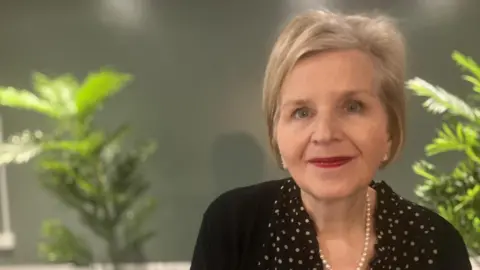Apology over delay to maternity report publication
 PA Media
PA MediaThe healthcare watchdog has apologised over delays to the publication of its report into maternity services in Nottingham, which is subject of the largest inquiry of its kind in the NHS.
Care Quality Commission (CQC) inspections - in June and July - found seven breaches of regulation in safe care and treatment at Nottingham University Hospitals (NUH) NHS Trust's two main hospitals.
Overall, maternity services have been rated as requires improvement for being safe and well-led.
Following criticism from Donna Ockenden, who is leading the review into maternity deaths and injuries at the trust, the CQC has admitted the report was not published "as soon after the inspection as it should have done".
 PA Media
PA MediaThe CQC ask five key questions - are services safe, effective, caring, responsive to people's needs, and are they well-led?
Following an inspection carried out on 18 June, 19 June and 3 July, the CQC's rating for maternity services at both hospitals - the Queen's Medical Centre (QMC) and City Hospital - being effective improved from requires improvement to good.
Caring was re-rated as good, while a responsive rating was not included in the inspection and remains good.
Following publication of its report, the CQC apologised for the delays, which senior midwife Ms Ockenden labelled "unacceptable" last month.
"Due to a large-scale transformation programme at CQC, this report [was] not published as soon after the inspection as it should have done," a CQC spokesperson said.
"The programme involved changes to the technology CQC uses but resulted in problems with the systems and processes rather than the intended benefits. The amount of time taken to publish this report falls far short of what people using services and the trust should be able to expect and the CQC apologises for this."

The CQC said last year's inspection of the trust was prompted by concern from staff.
The watchdog said the regulation breaches at the City Hospital related to infection control procedures, equipment safety, medicines and expressed milk storage.
Breaches at the QMC concerned infection control procedures, equipment safety, and medicines management and storage.
Inspectors noted learning opportunities were not always shared consistently with staff to promote good practice, and that low numbers of sufficiently qualified staff meant suitable resources were not always possible.
Other issues were that people were not always confident about raising concerns, medicine storage was put at risk by inconsistent temperature regulation, and checks on emergency equipment were not always completed.
An action plan focusing on these concerns has already been submitted by the trust, inspectors said.
However, the CQC also found most people felt the environment was safe and could mostly access care when they needed it.

Helen Rawlings, interim director of network operations in the Midlands at the CQC, said: "It's clear that staff and leaders had worked hard to make some improvements, and since the inspection last year, leaders have assured us that further improvements have been made.
"We'll continue to monitor the trust to ensure that more changes are made and embedded so women, people using the service and their babies receive the safe care they have a right to expect."
Anthony May, chief executive at the trust, added: "I recognise that these inspections took place after colleagues in maternity services contacted the CQC directly. I want to thank them for their courage in speaking up.
"Importantly, the CQC found that women and families are treated with kindness and compassion, and that our environments are predominantly safe and deliver good outcomes.
"All breaches of regulation raised during the inspection have been addressed and we have provided the CQC with an action plan to assure them of compliance.
"We know that more must be done to improve the quality of care that women and families receive, but our communities can be assured that we are moving in the right direction."
By the end of May this year, it is expected the maternity review of the trust will be examining 2,500 cases in which mothers or babies have died or been injured - the bulk of them between 2012 and the present day.
The increased caseload now means the inquiry is working to a new timeline. Instead of the final report being published in September 2025, it is now due to be delivered in June 2026.
Last month, the trust was handed the largest ever fine for failings in maternity care, connected to the deaths of three babies - all within 14 weeks of each other - in 2021.

Sherwood Forest MP Michelle Welsh has campaigned for improvements to maternity services in Nottingham
Her own experiences of giving birth to her son are being considered by the Ockenden review.
She said: "Today marks the five-year anniversary of my own experience of the failings of Nottingham's maternity services.
"When I regularly meet with families who have been deeply affected by the ongoing maternity scandal, I understand and share the profound pain and trauma that many have gone through. While my son is alive, many suffered great harm or did not survive.
"It is clear from the CQC's report that there has been some improvement.
"However, I remain concerned that the safety element requires improvement.
"I acknowledge the work that has gone into improving services, but we cannot ignore that concerns remain around staffing, sharing learning, and ensuring that all voices are heard within the service."
Welsh, who said she recently met Health Secretary Wes Streeting to discuss maternity care , said it was evident that maternity services in Nottingham and across the country still required urgent attention and further action.
She added: "Over four-and-a-half years ago, I called for a national inquiry into maternity services, and I remain steadfast in that demand.
"Nottingham must play a central role in ensuring no more families suffer unnecessary tragedies."
Analysis
By Rob Sissons, BBC East Midlands health correspondent
There is a question as to how valuable this latest snapshot into Nottingham's pressured maternity units really is.
It is a snapshot but a somewhat historic one.
The CQC has apologised for the delay, blaming new computer systems.
It nevertheless offers an evidenced snapshot from outside the hospital trust. The latest report acknowledges some progress but demonstrates a service still short of where it needs to be.
It underlines what Donna Ockenden has always stressed - that turning around the troubled service was "always going to be a marathon - not a sprint". That will not come as a surprise to campaigning harmed families, who continue to push for more accountability.

Follow BBC Nottingham on Facebook, on X, or on Instagram. Send your story ideas to [email protected] or via WhatsApp on 0808 100 2210.
